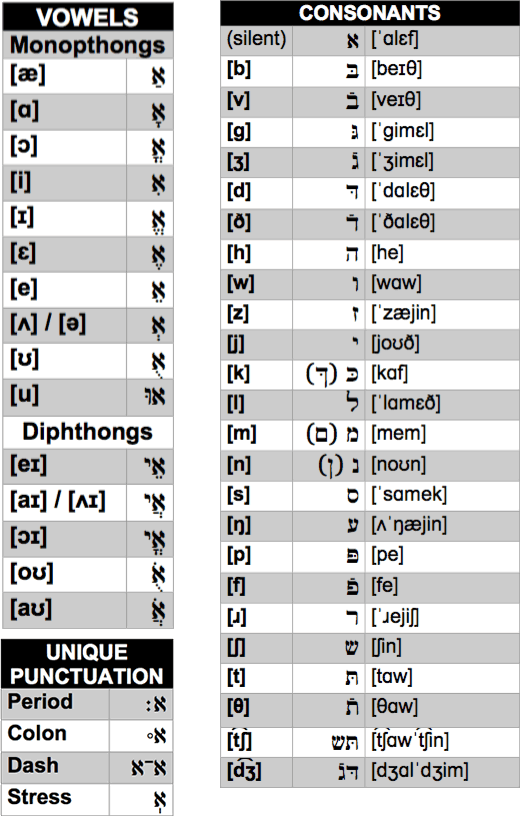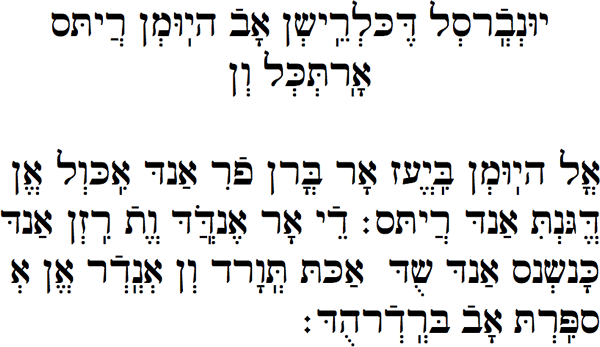
Inglith is a writing system for English using a modified Hebrew abjad developed by Isaac Mayer. In many Jewish communities the Hebrew writing system was adapted for local languages, eventually separating into Jewish languages like Yiddish (from German), Ladino (from Spanish), or Judeo-Arabic. In the case of England, though, the entire Jewish community was expelled in 1290 by King Edward I, so a Hebrew-derived writing system did not have the time to form. This system is an attempt to rectify that wrong.
Modern Israeli Hebrew has a limited consonant and vowel range. But ancient Hebrew had a larger one, and this system expands on that even more. The six “beged-kefet” בגד־כפת in the Hebrew abjad originally had two sounds, a fricative and a plosive. In most modern dialects many of the fricatives have been dropped. This system brings some of them back in altered forms. As well, consonants with no necessary parallel in English are either dropped (like ח, ט, צ, ק) or assigned a different sound (usually with a historical parallel in some Hebrew pronunciation tradition).
Although Hebrew is an abjad, some writing systems of Hebrew origin (like Yiddish) are technically alphabets. This system takes a middle path and follows an “abugida” system, where vowels are diacritic but mandatory. Since the English range of vowel sounds is wider than the Hebrew one, many vowel markings which (in standard Israeli Hebrew) sound the same are altered to sound different.
Since English stress systems are more complicated than Hebrew’s or any other Jewish language, a stress mark, like the Hebrew “meteg,” is found on every word. Whichever letter and vowel the symbol is on is the greater stress. Lesser stresses are not marked. Punctuation is largely the same, but the period is a colon like a Hebrew “silluq,” the colon is an empty circle, and the dash is higher and smaller, like the Hebrew “maqaf.”


All human beings are born free and equal in dignity and rights. They
are endowed with reason and conscience and should act towards one another
in a spirit of brotherhood.
(Article 1 of the Universal Declaration of Human Rights)
Ajalaptlajkuilolistli, Čveneburuli / Judeo-Georgian, Grekoiberieraren Alfabeto Berria, Hágrít Nyelv, Inglith, iŋliʃ fidæl, nā hōʻailona ʻōlelo, Pikchukunap Qillqa, Ṣəḥəfätä Ǝsəraelawi, Tianjinjiao, Yahudi Türkçesi, Yūdu lipi
Constructed scripts for: Ainu | Arabic | Chinese languages | Dutch | English | Hawaiian | Hungarian | Japanese | Korean | Lingala | Malay & Indonesian | Persian | Tagalog / Filipino | Russian | Sanskrit | Spanish | Taino | Turkish | Vietnamese | Welsh | Other natural languages | Colour-based scripts | Tactile scripts | Phonetic/universal scripts | Constructed scripts for constructed languages | Adaptations of existing alphabets | Fictional alphabets | Magical alphabets | A-Z index | How to submit a constructed script
[top]
You can support this site by Buying Me A Coffee, and if you like what you see on this page, you can use the buttons below to share it with people you know.

If you like this site and find it useful, you can support it by making a donation via PayPal or Patreon, or by contributing in other ways. Omniglot is how I make my living.
Note: all links on this site to Amazon.com, Amazon.co.uk
and Amazon.fr
are affiliate links. This means I earn a commission if you click on any of them and buy something. So by clicking on these links you can help to support this site.
[top]